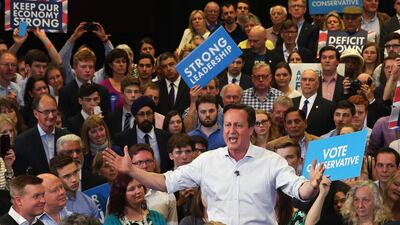When Britons go to the polls tomorrow, it will be after one of the strangest election campaigns for decades. At one level, hardly more could be at stake: the rise of Scottish nationalism means that it could presage the break-up of the union of England, Wales, Scotland and Northern Ireland.
At another, it seems sometimes as though precious little is at stake, with prime minister David Cameron and opposition leader Ed Miliband acting like two bald men fighting over a comb. They exaggerate their differences, although their parties – the Conservatives and Labour – have correctly been accused of stealing the other’s clothes to appeal to the centre.
And both are insistent that they can and will win a parliamentary majority when it is a near certainty that there will be another hung parliament, with a coalition of two or more parties going on to form the next government – with all the compromises such wrangling inevitably entails.
There will be plenty of post-election analyses about whether Mr Cameron seemed too relaxed and patrician, or Mr Miliband too geeky and left-wing. But the real lesson to be drawn from these polls is this: they demonstrate, more than probably any other in the UK’s history, why first past the post is not fit for British elections any more, and that the only sensible move would be to embrace proportional representation (PR).
Countless other democracies use one version or another of it, from party lists to single transferable vote multi-member constituencies, and appear to suffer no great adversity from doing so. If the instability that PR is supposed to cause has led Germany to suffer, for instance, many other countries might wish to undergo similar pain if that is the price for such economic strength.
In the past, the case for first past the post was based on two main planks. Firstly, it retained the constituency link between the people and the MP and secondly, in a two party system, voters had a clear chance to kick the government out – there was strong accountability. The latter was a particularly forceful argument. You can’t vote to boot a coalition out of government, since in a multiparty system you never know which combination will form an administration after an election.
And it is true that PR encourages such a system since voters know that every ballot counts, unlike under first past the post where votes cast in constituencies where other parties win are effectively wasted.
But the option of strong one party government has disappeared from the UK. The lost dominance of the two major parties is not, I believe, a temporary phase but the culmination of a long-term trend. Tony Blair secured his last majority in 2005 with only 36 per cent of the vote – the lowest share in British electoral history, and one that ought to have brought the democratic process into disrepute. Imagine the howls of outrage if Vladimir Putin won an election on a similar percentage. Yet in Britain it caused no more than a shrug. That’s how we do elections, appeared to be the response.
But not any more – not in a political landscape where the two old parties are now surrounded by third, fourth and fifth forces; where the Scottish National Party (SNP) is not merely nipping at the heels of Labour in its homeland, but threatening to unseat possibly all its 41 MPs in Scotland. And where the Liberal Democrats and the United Kingdom Independence Party (UKIP) both look likely to secure at least around 10 per cent of the vote, while other slivers will go to the Greens, Welsh nationalists and the Northern Irish parties.
Under these circumstances, an electoral system that wildly misrepresents the proportions of votes cast for different parties simply cannot be justified. The SNP may win 8 per cent of Britain’s MPs on 4 per cent of the vote. UKIP’s vote could garner one or two, or even no, MPs. The Liberal Democrats have done better in terms of representation recently, but historically their small numbers in parliament were a disgrace. The most egregious example was in 1983, when the Lib Dem’s predecessors’ 25 per cent of the vote translated into a paltry 23 MPs – whereas Labour, with only two per cent more, elected 209 MPs.
This is not an argument in favour of smaller parties. It is about fair and appropriate representation. This is why the Alternative Vote, which Britain rejected in a referendum in 2011, is no solution without a PR-elected top-up list. As the Jenkins Commission into electoral reform concluded in 1998: “So far from doing much to relieve disproportionality, [AV] is capable of substantially adding to it.”
There is PR for European, Scottish and Welsh elections in the UK, so the principle has been accepted. It cannot be cast as a continental innovation somehow alien to Britain’s ancient parliamentary system. Now it’s time for it at Westminster too.
There is always talk of reforming Britain’s parliament. Critics complain of its combative “yah boo” debates and the flummery of costumes and traditions that date back centuries.
But those are the wrong reforms. It is how Britain elects its MPs and comes to form governments that needs to change – for, in a multiparty age where small bands of MPs could wield huge influence in determining the next government, the results of the British electoral system are now dangerously, disproportionately unreflective of the votes of the people.
Whether the Speaker wears a wig and MPs wave their order papers in the chambers or not are trivial, irrelevant and inconsequential by comparison.
Sholto Byrnes is a Senior Fellow at the Institute of Strategic and International Studies, Malaysia


